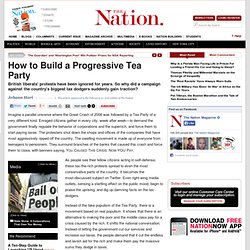

Bloggers are best at covering local cuts across the UK: so we're being banned. Bloggers are essential for covering the council cuts: we know the local scene, are immune to pressure from politicians, and are always on the ground.

Is that why councils are attempting to ban us from filming, recording or tweeting in controversial meetings? Like a number of bloggers, I turned up at last week's Barnet council meeting to call leader Lynne Hillan's bluff. Hillan had banned bloggers from filming, recording and tweeting this controversial budget-setting meeting (Barnet was due to agree about £29m in service cuts).
I'm getting a little tired of this snotty line from local elected representatives (not least because they're on thin ice in the legislative sense and as far as very recent government guidance is concerned). I fear our elected representatives forget themselves from time to time. I'm a bit of a veteran of run-ins with high-handed councillors who hold perverse views about the public's right to collect and share local democracy news.
Fair enough, too. Naomi Klein on Anti-Union Bills and Shock Doctrine American-Style: "This is a Frontal Assault on Democracy, It's Kind of a Corporate Coup D'Etat" This is a rush transcript.

Copy may not be in its final form. AMY GOODMAN: Rallies for workers’ rights are spreading across the country. In Michigan, over a thousand people rallied at the State Capitol in Lansing to oppose a measure allowing the breaking of labor contracts by placing schools and districts under emergency management. In a scene reminiscent of Wisconsin, hundreds of demonstrators packed the Capitol Rotunda chanting slogans. Protests were also held against anti-union bills Tuesday in Indiana, Ohio, Iowa, Florida and Tennessee. Meanwhile, in Idaho, the state legislature has given final approval to a measure restricting the collective bargaining of public school teachers.
As a wave of anti-union bills are introduced across the country in the wake of the Great Recession, many analysts are picking up on the theory that award-winning journalist and author Naomi Klein first argued in her bestselling book The Shock Doctrine: The Rise of Disaster Capitalism. NAOMI KLEIN: Hi, Amy. How to Build a Progressive Tea Party. Imagine a parallel universe where the Great Crash of 2008 was followed by a Tea Party of a very different kind.

Enraged citizens gather in every city, week after week—to demand the government finally regulate the behavior of corporations and the superrich, and force them to start paying taxes. The protesters shut down the shops and offices of the companies that have most aggressively ripped off the country. The swelling movement is made up of everyone from teenagers to pensioners.
They surround branches of the banks that caused this crash and force them to close, with banners saying, You Caused This Crisis. Now YOU Pay. We Recommend Gather some friends, pick a tax dodger and get on the street! About the Author Johann Hari Johann Hari is a columnist for the Independent in London and a contributing writer for Slate. Also by the Author As people see their fellow citizens acting in self-defense, these tax-the-rich protests spread to even the most conservative parts of the country. Msnbc Video. We All Work at Enron Now - Umair Haque. Remember Enron?

That paragon of turn-of-the-century new-economy triumphalism, gushed over by pundits, lauded by investors, celebrated by the cognoscenti — until it turned out to be a roadside bomb in disguise? The cause of its demise, ultimately: overstating benefits and understating costs. The result, of course, was a spectacular flameout, today the stuff of legend.
So here’s a question. Is the global economy going Enron? You might say, “Well, if it does I can see how it’s unfair, but so is life, you big girl’s blouse. The Enron effect is highly hazardous because it lethally poisons incentives. Let’s take a moment and imagine what might happen in an economy that consistently, chronically undercounted real costs and overcounted real benefits, poisoning the incentives for the creation of authentic, enduring wealth. Innovation atrophy. Here’s Enronia’s really big problem. That sounds less and less like some Twilight Zone counterfactual and more and more like our own Great Stagnation.